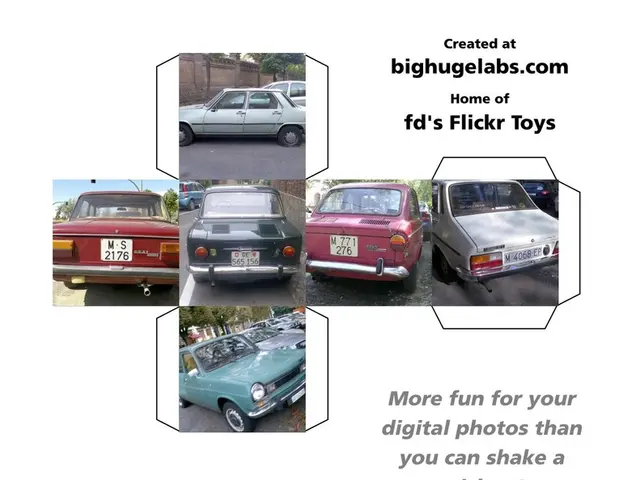Forecast: A Single Shares' Value Expected to Surpass That of Tesla Within the Next Decade
Toyota's Multi-Path Electrification Strategy: A Comprehensive Approach to Zero Emissions
Toyota Motor Corporation, a global powerhouse in the automotive industry, is redefining its role as a mobility company with a long-term plan that emphasizes a multi-path electrification strategy. This strategy encompasses hybrids, battery electric vehicles (BEVs), and hydrogen fuel cell vehicles (FCVs), positioning Toyota as a serious supplier of gas-free vehicles by 2035.
The Japanese conglomerate, renowned for its quality and reliability in a wide range of driving conditions, introduced the world's first mass-produced hybrid car, the Prius, in 1997. Since then, Toyota has been at the forefront of hybrid technology, a position it aims to leverage for broader market coverage.
Toyota's focus on FCVs is predominantly on heavy vehicles, such as trucks and buses, with passenger cars and SUVs expected to join the party over time. The company is investing heavily in hydrogen FCVs, like the second-generation Mirai, which they see as especially important for heavy transport, buses, trucks, and sectors where batteries have limitations.
While other automakers like Stellantis are exiting the hydrogen space, Toyota remains committed to hydrogen technology. They are pursuing new fuel cell modules, trials of hydrogen-electric hybrids, and ongoing innovation to reduce costs and scale infrastructure.
Compared to Tesla, which focuses almost exclusively on BEVs and battery technology, Toyota's multi-path approach—blending hybrids, BEVs, and hydrogen—positions it differently. Toyota's hybrid leadership and hydrogen expertise provide a broader market coverage, especially in regions or segments without extensive BEV infrastructure.
By 2035, Toyota expects this diversity will help it reduce emissions quickly and maintain market presence globally, potentially enabling growth alongside Tesla, which aims for full BEV dominance. The company's strategy includes expanding hybrids and plug-in hybrids (PHEVs) as leading offerings, while also developing BEVs like the bZ4X.
In addition to its electrification efforts, Toyota is also focusing on sustainability and renewable energy usage across manufacturing and supply chains to meet ambitious emission reduction targets. The company aims for 100% renewable energy at all global plants and a 68% cut in direct (Scope 1 and 2) emissions compared to 2019.
Toyota Motor Corporation is more than just a car maker. It is a complex business empire with global scale and innovative ambitions. In addition to its automotive operations, the company has market-leading operations spanning various industries, including banking, where its division accounted for 8% of its total sales in the previous year.
In terms of financials, Toyota's full-year cash from operations was $24.3 billion, compared to Tesla's $16.8 billion. However, Tesla's stock has high valuation ratios, with a P/E ratio of 183 and P/S at 11.2, while Toyota's stock trades at low valuation ratios, such as 7.2 times earnings and 0.7 times sales.
In the same period, Toyota's global sales were $315 billion, compared to Tesla's $95.7 billion. Despite having a smaller stock market value than Tesla, Toyota is expected to have a larger market footprint than Tesla before 2035.
In conclusion, Toyota's multi-path electrification strategy, focusing on hybrids, BEVs, and FCVs, differentiates the company and may enable more flexible growth across the eco-friendly transportation market by 2035, complementing Tesla's BEV-focused, battery-centric model. Toyota's commitment to sustainability, renewable energy, and infrastructure development positions it as a key player in the transition to a zero-emission future.
[1] Toyota Motor Corporation (2022). Toyota's Multi-Path Electrification Strategy. Retrieved from https://global.toyota/en/newsroom/corporate/29693683.html [2] Reuters (2022). Toyota to boost hydrogen fuel cell vehicle production, aiming for 30% of sales by 2030. Retrieved from https://www.reuters.com/business/autos-transportation/toyota-boost-hydrogen-fuel-cell-vehicle-production-aiming-30-sales-2030-2022-04-27/ [3] Green Car Congress (2022). Toyota to expand its hydrogen fuel cell vehicle lineup with the second-generation Mirai. Retrieved from https://www.greencarcongress.com/2022/04/20220427-toyota2.html [4] CNBC (2022). Toyota aims to be a serious supplier of gas-free vehicles by 2035. Retrieved from https://www.cnbc.com/2022/04/27/toyota-aims-to-be-a-serious-supplier-of-gas-free-vehicles-by-2035.html
- Toyota Motor Corporation, in its pursuit of a zero-emission future, is investing in various forms of electrification and technology, not just focusing on battery electric vehicles (BEVs) like Tesla, but also leveraging its expertise in hybrids and hydrogen fuel cell vehicles (FCVs).
- The Japanese conglomerate recognizes the potential of hydrogen FCVs, particularly for heavy transport, buses, trucks, and sectors where batteries have limitations, and is allocating significant funds for their development and production.
- Beyond its automotive operations, Toyota's financial division plays a substantial role in its overall business, contributing 8% of its total sales in the previous year, exhibiting its diversified approach in finance and investments.








